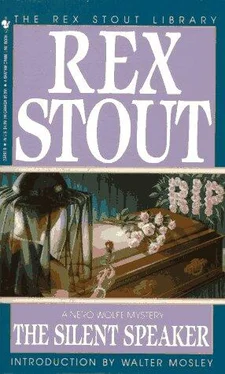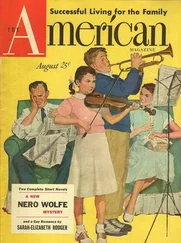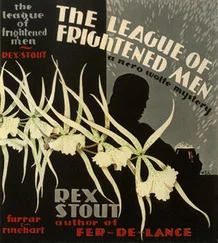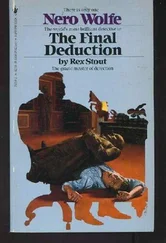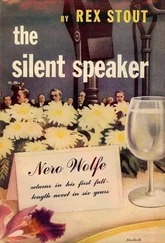Rex Stout - The Silent Speaker (Crime Line)
Здесь есть возможность читать онлайн «Rex Stout - The Silent Speaker (Crime Line)» весь текст электронной книги совершенно бесплатно (целиком полную версию без сокращений). В некоторых случаях можно слушать аудио, скачать через торрент в формате fb2 и присутствует краткое содержание. Жанр: Старинная литература, en-GB. Описание произведения, (предисловие) а так же отзывы посетителей доступны на портале библиотеки ЛибКат.
- Название:The Silent Speaker (Crime Line)
- Автор:
- Жанр:
- Год:неизвестен
- ISBN:нет данных
- Рейтинг книги:5 / 5. Голосов: 1
-
Избранное:Добавить в избранное
- Отзывы:
-
Ваша оценка:
- 100
- 1
- 2
- 3
- 4
- 5
The Silent Speaker (Crime Line): краткое содержание, описание и аннотация
Предлагаем к чтению аннотацию, описание, краткое содержание или предисловие (зависит от того, что написал сам автор книги «The Silent Speaker (Crime Line)»). Если вы не нашли необходимую информацию о книге — напишите в комментариях, мы постараемся отыскать её.
The Silent Speaker (Crime Line) — читать онлайн бесплатно полную книгу (весь текст) целиком
Ниже представлен текст книги, разбитый по страницам. Система сохранения места последней прочитанной страницы, позволяет с удобством читать онлайн бесплатно книгу «The Silent Speaker (Crime Line)», без необходимости каждый раз заново искать на чём Вы остановились. Поставьте закладку, и сможете в любой момент перейти на страницу, на которой закончили чтение.
Интервал:
Закладка:
“No, but he would.”
“I don’t doubt it.” O’Neill was in his stride now, earnest and persuasive. “But you see, neither of us actually wants to go to the police. Actually our interests coincide. It’s merely a question of procedure. Look at it from your personal angle: what you want is to be able to go to your employer and say to him, ‘You sent me to do a job, and I have done it, and here are the results,’ and then deliver this leather case to him, and me right there with you if you want it that way. Isn’t that what you want?”
“Sure. Let’s go.”
“We will go. I assure you, Goodwin, we will go.” He was so sincere it was almost painful. “But does it matter exactly when we go? Now or four hours from now? Of course it doesn’t! I have never broken a promise in my life. I’m a businessman, and the whole basis of American business is integrity-absolute integrity. That brings us back to my moral rights in this matter. What I propose is this: I will go to my office, at 1270 Sixth Avenue. You will come there for me at three o’clock, or I will meet you anywhere you say, and I will have this leather case with me, and we will take it to Nero Wolfe.”
“I don’t-”
“Wait. Whatever my moral rights may be, if you extend me this courtesy you deserve to have it acknowledged and appreciated. When I meet you at three o’clock I will hand you one thousand dollars in currency as evidence of appreciation. A point I didn’t mention: I will guarantee that Wolfe will know nothing about this four-hour delay. That will be easy to arrange. If I had the thousand dollars with me I would give it to you now. I have never broken a promise in my life.”
I looked at my wrist and appealed to him, “Make it ten thousand.”
He wasn’t staggered, but only grieved, and he wasn’t even grieved beyond endurance. “That’s out of the question,” he declared, but not in a tone to give offense. “Absolutely out of the question. One thousand is the limit.”
I grinned at him. “It would be fun to see how far up I could get you, but it’s ten minutes to eleven, so in ten minutes Mr. Wolfe will come down to his office and I don’t like to keep him waiting. The trouble is it’s Sunday and I never take bribes on Sunday. Forget it. Here are the alternatives: You and I and the object under your coat go now to Mr. Wolfe. Or give me the object and I take it to him, and you go for a walk or take a nap. Or I yell at that cop across the street and tell him to call the precinct, which I admit I like least, but you’ve got your moral rights. Heretofore I’ve been in no hurry, but now Mr. Wolfe will be downstairs, so I’ll give you two minutes.”
He wanted to try. “Four hours! That’s all! I’ll make it five thousand, and you come with me and I’ll give it to you-”
“No. Forget it. Didn’t I say it’s Sunday? Come on, hand it over.”
“I am not going to let this case out of my sight.”
“Okay.” I got up and crossed to the curb and stood so as to keep one eye out for a taxi and one on him. Before long I flagged an empty and it turned in to me and stopped. It had probably been years since Don O’Neill had done anything he disapproved of as strongly as he did of arising and walking to the cab and getting in, but he made it. I dropped beside him and gave the driver the address.
Chapter 14
TEN HOLLOW BLACK CYLINDERS, about three inches in diameter and six inches long, stood on end in two neat rows on Wolfe’s desk. Beside them, with the lid open, was the case, of good heavy leather, somewhat battered and scuffed. On the outside of the lid a big figure four was stamped. On its inside a label was pasted:
BUREAU OF PRICE REGULATION
POTOMAC BUILDING
WASHINGTON, D.C.
Before pasting in the label someone had typed on it in caps: OFFICE OF CHENEY BOONE, DIRECTOR.
I was at my desk and Wolfe was at his. Don O’Neill was walking up and down with his hands in his pants pockets. The atmosphere was not hail-fellow-well-met. I had given Wolfe a full report, including O’Neill’s last-minute offer to me of five grand, and Wolfe’s self-esteem was such that he always regarded any attempt to buy me off as a personal affront, not to me but to him. I have often wondered who he would blame if I sold out once, himself or me.
He had repudiated without discussion O’Neill’s claim to a moral right to hear what was on the cylinders before anyone else, and when O’Neill had seen it was hopeless the look on his face was such that I had decided to make sure and had given him a good frisking. He was not packing any tools, but that had not improved the atmosphere. The question then arose, how were we to make the cylinders perform? The next day, a business day, it would have been easy, but this was Sunday. It was O’Neill who solved the problem. The President of the Stenophone Company was a member of the NIA and O’Neill knew him. He lived in Jersey. O’Neill phoned him and, without disclosing any incriminating details, got him to phone the manager of his New York office and showroom, who lived in Brooklyn, and instruct him to go to the showroom, get a Stenophone and bring it to Wolfe’s office. That was what we were sitting there waiting for-that is, Wolfe and I were sitting and O’Neill was walking.
“Mr. O’Neill.” Wolfe opened his eyes enough to see. “That tramping back and forth is extremely irritating.”
“I’m not going to leave this room,” O’Neill declared without halting.
“Shall I tie him up?” I offered.
Wolfe, ignoring me, told O’Neill, “It will probably be another hour or more. What about your statement that you got possession of this thing innocently? Your word. Do you want to explain that now? How you got it innocently?”
“I’ll explain it when I feel like it.”
“Nonsense. I didn’t take you for a nincompoop.”
“Go to hell.”
That always annoyed Wolfe. He said sharply, “Then you are a nincompoop. You have only two means of restraining Mr. Goodwin and me: your own physical prowess or an appeal to the police. The former is hopeless; Mr. Goodwin could fold you up and put you on a shelf. You obviously don’t like the idea of the police, I can’t imagine why, since you’re innocent. So how do you like this: when that machine has arrived and we have learned how to run it and the manager has departed, Mr. Goodwin will carry you out and set you on the stoop, and come back in and shut the door. Then he and I will listen to the cylinders.” O’Neill stopped walking, took his hands from his pockets and put them flat on the desk to lean on them, and glowered at Wolfe.
“You won’t do that!”
“I won’t. Mr. Goodwin will.”
“Damn you!” He held the pose long enough for five takes, then slowly straightened up. “What do you want?”
“I want to know where you got this thing.”
“All right, I’ll tell you. Last evening-”
“Excuse me. Archie. Your notebook. Go ahead, sir.”
“Last evening around eight-thirty I got a phone call at home. It was a woman. She said her name was Dorothy Unger and she was a stenographer at the New York office of the Bureau of Price Regulation. She said she had made a bad mistake. She said that in an envelope addressed to me she had enclosed something that was supposed to be enclosed in a letter to someone else. She said that she had remembered about it after she got home, and that she might even lose her job if her boss found out about it. She asked me when I received the envelope to mail the enclosure to her at her home, and she gave me her address. I asked her what the enclosure was and she said it was a ticket for a parcel that had been checked at Grand Central Station. I asked her some more questions and told her I would do what she asked me to.”
Читать дальшеИнтервал:
Закладка:
Похожие книги на «The Silent Speaker (Crime Line)»
Представляем Вашему вниманию похожие книги на «The Silent Speaker (Crime Line)» списком для выбора. Мы отобрали схожую по названию и смыслу литературу в надежде предоставить читателям больше вариантов отыскать новые, интересные, ещё непрочитанные произведения.
Обсуждение, отзывы о книге «The Silent Speaker (Crime Line)» и просто собственные мнения читателей. Оставьте ваши комментарии, напишите, что Вы думаете о произведении, его смысле или главных героях. Укажите что конкретно понравилось, а что нет, и почему Вы так считаете.
